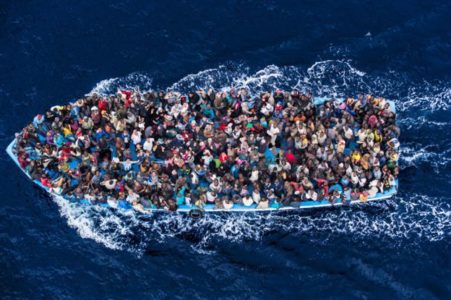Exceptional circumstance – but for whom?
Old reflexes work again in Europe’s migration crisis management

© MASSIMO SESTINI / EYEVINE
While Italian authorities and charity workers are ringing the alarm bells for a dangerously approaching new wave of the migration crisis, Europe is still not able to digest what have happened in 2015. The gravity of the crisis situation can still be interpreted according to certain political interests.
This week, right before the EU starts its one-month Aurora-sleep, the European Court of Justice (ECJ) and its Advocate General have published two important pieces related to the controversial events of the summer of 2015. From one hand, the Court stated that Slovenia and Austria legally deported hundreds of migrants back to Croatia applying the Dublin Regulations, given that those people entered the EU’s territory the first time by crossing the Western Balkans country’s borders. Therefore, Croatia was meant to start evaluating their asylum application. But as it often happens with the case-law, the devil is in the details: the ECJ has interpreted the notion of “exceptional circumstance” in a way that the arrival of more than a million migrants in Europe does not fall into that category.
In fact, the final decision tells against the opinion of the ECJ’ Advocate General, who did think before that those crisis days could be considered as an “exceptional circumstance”. This controversy is particularly interesting because this week Yves Brot has released another opinion, concerning the lawsuit in which Hungary’s and Slovakia questioned the legitimacy of the obligatory relocation system of asylum seekers. The Advocate General has rejected the two countries’ reasoning, and concluded that the mandatory relocation system of 120 000 migrants was an appropriate measure to respond to the migration crisis that was indeed an emergency situation. So, contrary to Hungary’s and Slovakia’s claims, the EU didn’t overreach its competences.
As the Slovenia and Austria’s case shows very well, the ECJ is not obliged to take the Advocate General’s opinion. Therefore, the final decision in Hungary’s and Slovakia’s affair might bring some surprises if the Court wants to be true to itself. However, right after the opinion was released, the European Commission sent an official request to Hungary, Czech Republic and Poland to start implementing the relocation system.
Nevertheless, this battle of words seems a bit pointless in the light of the quota system’s total failure. No matter how the Commission’s latest report tries to depict as a success the “fivefold increase” of relocated people compared to the same period of last year, European states accepted only 21 000 people out of the concerned 120 000. From a number that was even two years ago seen as an insufficient result of a political compromise. By now, this whole story seems even more ridiculous, given that more than 93 000 people reached Italy this year, which exceeds the number of arrivals in the first part of 2016 and hundreds of thousands are waiting in Libya for the good wind to cross the sea.
But this week, the irony of the European migration crisis management could reach an even higher level. First, Martin Schulz, the leader of the German social democrats started to scarce the public opinion, implying that the 2015 crisis might return if we don’t care. He is undeniably right, but the timing of this discourse is a bit suspicious. He and his advisors might have felt that they needed to act to counterbalance his vanishing popularity in the election campaign. So, it was high time to bring the issue of her most debated decision against the incumbent chancellor. As another attempt to position himself as the savior of Europe, Schulz even visited Italy and called for help.
But he can only be the Number 2 Savior of Europe behind French President Emmanuel Macron, who declared Thursday that France will set up hot spots in Libya in order to evaluate the migrants’ asylum. On paper, the idea seems fine, but one can hardly imagine that those determined people, who already survived hundred-kilometers-journeys in the desert and the insults of human traffickers, will understand the refusal and turn back to their home country where they sold up everything to finance their route to Europe. Not to mention the legal aspects of French and not EU hotspots. But the logic behind is just the same. Macron wants to perform better in polls, so he needed some catchy topic to influence the public opinion.
Just like in the case of the often-criticized Eastern European Member States, the migration crisis is still a wonderful opportunity for politicians to strengthen their popularity without doing anything particular. A kind of exceptional circumstance.
